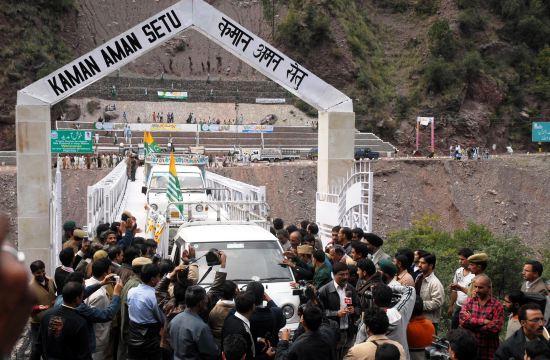
[stextbox id=”info”]Started with fanfare, the Trans-LoC trade through the Jehlum Valley Road, bogged down by lack of modalities has got restricted to few people trading with their kin on either side. Trade, however, is surging on the Poonch crossover at Chakan da Bagh, where Jammu traders seem to have taken over. HAMIDULLAH DAR and R S GULL report from the two crossing points.[/stextbox]
The pompous beginning of trans-LoC trade on October 21 last year has lost most of its sheen, leaving it for divided families to sustain the trade. Barring a few who visited Muzaffarabad personally and settled terms with their counterparts, most of the traders either deal only with their relatives living across the line of control (LoC) or seek a counter guarantee from relatives of PaK traders living here. Ironically no state minister or district level administrator has visited the Trade Facilitation Centre at Salamabad to review the development of trade between two parts of Kashmir despite the media glare it witnessed on its initiation.
“Had it been for authorities to mould its course, it (trade) would have vanished soon after its historic beginning. We suffered losses but continued only to sustain this opportunity of cross LoC initiative,” says Sheikh Tariq, President Salamabad-Chakoti Traders Union (SCTU).
The cross LoC trade has suffered due to lack of modalities like of money transfer and communication. The much touted trade, which was initiated after the land transfer row last year when Kashmiris sought an alternative to Srinagar-Jammu highway, has myriad intrinsic infirmities that can cause it to wilt. “In 21st century, we are compelled to trade through a barter system. Goods exported have to be exchanged in kind as there is no bank transfer facility on either side of the LoC which has made it a risky business for traders who do not have any relative on other side”, says Bait-u-Rahman Ganai, a trader from Janglat Mandi Islamabad.
Lack of communication facility at times results in losses. “We have to wait for traders from across to call us to settle for exchange of goods. Some time ago due to communication lapse a trader received Ber fruit from Chakoti which has no takers in valley and he had to throw them away incurring a loss of at least Rs 20 thousand,” complains Mohammad Tariq Khan, vice president, SCTU.
“Till date it is an inter-relations trade. More than 80 percent people involved in the trade have blood relations across LoC which proved crucial to survival of the trade,” informs Mohammad Ashraf Wani, Custodian of Salamabad’s Trade Facilitation Centre. “Some (traders) earlier sent goods across on their own that rotted in the godowns of Chakoti for want of any guarantor who could reciprocate the consignment with bartered items. There are hundreds of people keen to trade goods across LoC but capital blockade is a major hindrance.”
Nisar Ahmad Chechi Gojar, a driver from Lahore too attests that it is just an inter-relations trade. “People involved in this trade at Chakoti are all Kashmiri. They sell Kashmiri goods and fruits at Muzaffarabad, Rawalpindi and Lahore. I have to take this consignment (of onions) to Lahore,” says Gojar adding that people across LoC exhibit great affection for Kashmiri goods particularly apples that sell at Rs 90 per Kg at Murree (a health resort in Pakistan).
Details of cumulative trade till March 31, 2009 reveal that 180 truck loads have ferried 3880 quintals worth Rs 1.77 crore from Salamabad to Chakoti in 21 consignments. It included seven thousand apple boxes worth Rs 35 Lakhs and pulses worth Rs 24.75 Lakhs. Goods weighing 8343 quintals worth Rs 2.15 crore came from Chakoti in 230 trucks. It included, besides other things, carpets, prayer rags and 24 thousand orange (Kinno type) boxes.
Traders allege that a conspiracy was hatched by some vested interests to make the trade a failure. “Some dubious traders sent second grade fruits to Chakoti to create a bad and discouraging impression there regarding our fruits. However, we soon sensed the evil designs and tried to rectify the wrong,” says Bashir, a trader.
Interestingly, traders from this side and drivers from PaK acknowledge that armed forces of both the countries have never hindered the flow of goods. Instead, soldiers help do away with obstacles that traders face.
The number of items that can be traded across LoC has been limited by the two governments to 21. Traders opine that it is quiet a miniscule number keeping in view the demand for other items. “The trade should be expanded to 100 items and should include dairy products, baby foods, oils, sugar, tea leaves and cloth as well. The restriction limits the scope of the trade. These can prove detrimental to its survival in future,” says Raashid Ali Zargar, a trader from Srinagar.















